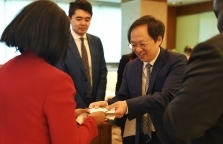On May 19, 2018, after nearly one year of negotiation and consultation, the Financial Center for South-South Cooperation (FCSSC), African Export-Import Bank (Afreximbank) and Made in Africa Initiative (MIAI) signed a strategic cooperation agreement, whereby the three parties will pull together to promote China-Africa trade development with the help of diversified financial instruments and resources. They also plan to build a financing platform worth USD 1 billion to accelerate industrialization in Africa. The attendees at the signing ceremony included FCSSC’s Vice President & Director General John Wu, Dr. Benedict Oramah, President of Afreximbank, Mr. Matt Liu, Deputy Investment Promotion Director at MIAI, Ms. Jenny Yao, Director General of South-South Education Foundation (SSEF), and Joyce Zhang, Deputy Director General of FCSSC.
FCSSC, Afreximbank, and MIAI, based on their common goals and benefits, will create close partnerships in industrial parks, export-oriented manufacturing, public financing platforms, market access, E-commerce platforms, resource networking sharing, capacity building, etc. On the one hand, they will support industrial park and infrastructure construction in Africa with capital from the public and private sectors to drive diversified development, including setting up a USD 1 billion fund to attract investment in South-South cooperation and industrialization in Africa; this fund will be raised in phases, with USD 100 million raised in the first phase. On the other hand, the three parties will build an information bridge between China and Africa considering that Hong Kong is an international service and trade center; moreover, they will establish an E-commerce platform whereby more small and medium-sized enterprises in African may have access to new markets and global value chains.
According to the representative of FCSSC, financial resources are essential to guarantee for industrialization and sustainable development, so industrialization in Africa will be effectively accelerated by innovating the financial cooperation system with the help of connectivity in finance and allowing the market-oriented financial mechanism to play its role.
Dr. Oramah said in the signing ceremony that Africa should draw on China’s experience since Africa should change its economic development models and diversify its industrial structure.
In Special Consultative Status with the United Nations Economic and Social Council (ECOSOC), FCSSC has been committed to providing a comprehensive platform for capacity cooperation and experience sharing among and financial service for developing countries. Expanding its businesses throughout the globe, in particular accelerating industrialization in Africa, FCSSC not only offers consultancy on industrialization strategy to the governments of African countries but also help governments and industrial parks attract investment. In 2016, FCSSC, in cooperation with the Institute of New Structural Economics at Peking University, China Merchants Group and MIAI, helped Djibouti plan and built its free trade zone in consideration of its comparative advantages. The President Ismaïl Omar Guelleh spoke highly of it when its development progress was reported to him.
As a multilateral financial organization designed to boost domestic and foreign trade of African countries, since its establishment at the beginning of 1990s, Afreximbank has been providing financial support for stable growth and diversified development of African trade in agriculture, energy, minerals, traffic, tourism, bulk commodities, telecommunication, financial service, small-sized processing and manufacturing, etc. Its shareholders include African national and regional financial organizations, public and private financial organizations and investors of African countries, as well as organizations and private investors beyond Africa.
Made in Africa Initiative aims to help African countries develop themselves against the context that Chinese labor-intensive industries shifted to those countries.


